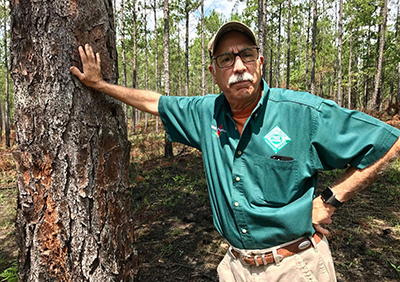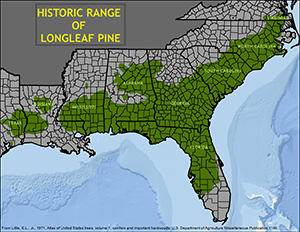 Salem Saloom, a retired surgeon, started buying land in Conecuh County Alabama in the early 1980s. After nine land purchases, his family now owns some 2,200 acres in Evergreen through 11 different transactions. He grows slash pine and loblolly, but he takes special pride in the cultivation of the longleaf, a tree that was almost wiped out by immense timbering more than a century ago. Throughout southeastern states there has been widespread efforts to recover the majestic trees. Saloom's sprawling forest is his small part of continuing this conservation effort. They became apart of the American Tree Farm system is 1986 after realizing the value of having a consultant forester, which has helped Saloom greatly.
Salem Saloom, a retired surgeon, started buying land in Conecuh County Alabama in the early 1980s. After nine land purchases, his family now owns some 2,200 acres in Evergreen through 11 different transactions. He grows slash pine and loblolly, but he takes special pride in the cultivation of the longleaf, a tree that was almost wiped out by immense timbering more than a century ago. Throughout southeastern states there has been widespread efforts to recover the majestic trees. Saloom's sprawling forest is his small part of continuing this conservation effort. They became apart of the American Tree Farm system is 1986 after realizing the value of having a consultant forester, which has helped Saloom greatly.
Salem Saloom was born and raised in Enterprise, Alabama where he earned a medical degree from Alabama University and become a well-known and respected physician and surgeon. The Salooms, Salem, his wife Dianne, and their son Patrick, have made faith, family, and a love of the land the foundation of their lives. In 1983, Saloom bought 158 acres of forest property in Conecuh County. His goal was to improve the land’s timber as well as habitats for wildlife. That was the initial creation of Saloom Properties. For the next 27 years, the Saloom’s would buy surrounding parcels of forestland which today totals 2,200 acres of Saloom Properties.
"We are intimately connected with the land, wearing our boot leather and investing elbow grease and time in stewardship practices" Saloom said.
Indeed Saloom is considered unique among long leaf conservationists. Robert Abernathy, president of The Long Leaf Alliance said "For a smaller landowner to do his own work, that's pretty special"
Longleaf pine was once one of the most extensive forest ecosystems in North America, covering an estimated 90 million acres. It spanned the Gulf and Atlantic coastal plains from Virginia to Texas and also reached further inland in areas of Florida, Alabama and Georgia. Today, the longleaf pine forests are one of the most endangered ecosystems in the United States. Less than four percent of longleaf pine forests remain — roughly 3.4 million acres.
When longleaf pine was at its peak, it was one of the most ecologically important tree species in the southern United States. Its forests hosted nearly 900 different plant species. Today, these forests are home to an estimated 100 bird, 36 mammals and 170 reptile and amphibian species. In addition, the U.S. Fish and Wildlife Service has listed 29 species that are associated with longleaf pine forests as threatened or endangered. This is why it’s so important that landowners, like Salem Saloom and his family, take the initiative to protect these trees on their property.

So what made this retired surgeon develop such an appreciation for long leaf pines? When Hurricane Ivan hit the Southeast in 2004, Saloom’s trees took a big hit. Most of the loblolly and slash pines on his property were overturned by Ivan, but the longleaf pines proved stronger. Seeing longleaf’s durability firsthand, and then learning of the many other benefits this tree provides, was a turning point for Saloom and his wife, Dianne, and their son, Patrick.
“Hurricane Ivan made us look at a different vision for this Tree Farm,” he says. “Looking into the future, we could see that restoring some of the longleaf in this area would be a valuable thing to do.” Since then, the Salooms have planted and carefully managed more than 650 acres of longleaf pine on their property.
Protecting and restoring longleaf pine forests is also an especially smart investment to make for our climate and air quality. This tree is resistant to fire and beetle infestation, thrives in wet and dry periods, and can withstand strong wind and weather events, as proven by it’s survival against Ivan. In fact, longleaf pine can live more than 150 years and in some cases, can even live up to 450 years.
Today, Saloom Properties has many different practices. Through partnerships with the Longleaf Alliance, the American Forest Foundation, and the National Wild Turkey Federation, Saloom learned that land ownership comes with a responsibility to not only be a good steward of the land, but also to promote relationships through education. Field trips are commonly offered to explore the forest and the Salooms host many family and community gatherings. Fishing, hunting, camping, horseback riding hiking, etc., are activities that can occur daily in the Salooms forest. For the past five years, the Salooms have been involved in the Forest in the Classroom Program in which they visit fifth grade classes and speak with them about forestry among other topics.
Saloom Properties have been in a variety of local and regional newspapers with articles written about their forestry tours, activities, and awards. They have been featured in radio shows, as well as many magazines such as, the Alabama Treasure Forest Magazine, the Cooperative News Magazine, and the Green Horizons Alabama Tree Farm Newsletter.
 Sign In
Sign In
 Sign In
Sign In
